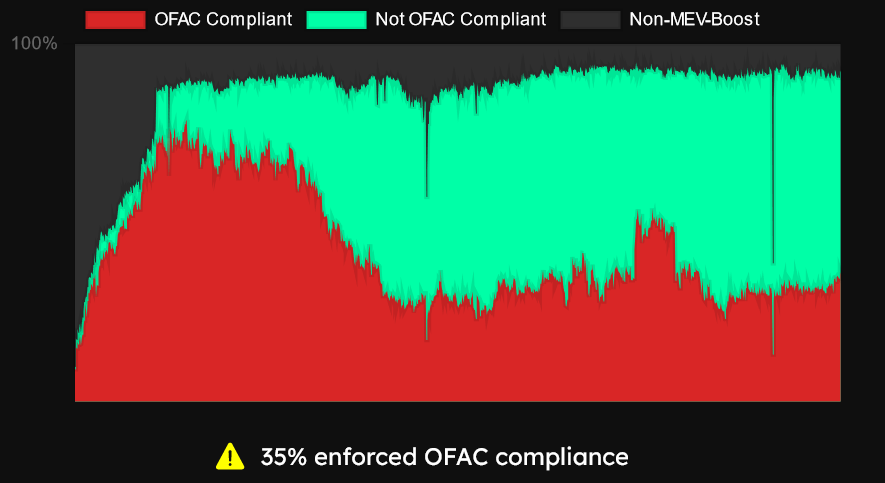[ad_1]
One of many largest producers of censorship-resistant blocks on Ethereum has made a whole u-turn, asserting it is going to begin censoring OFAC-sanctioned blocks throughout all of its MEV relays in compliance with native legal guidelines.
The agency, bloXroute Labs — which has produced not less than 400,000 Ethereum blocks from its two main Maximal Extraction Worth (MEV) relays — made the announcement of its coverage change on Dec. 18 in a publish on X (previously Twitter), noting:
“Efficient instantly, all bloXroute relays will reject block bids in the event that they comprise OFAC transactions.”
An “OFAC transaction,” as described by bloXroute Labs, is any that interacts with a pockets that has been sanctioned by the US Workplace of International Asset Management, or OFAC.
All of bloXroute Labs’ relays can be affected, together with the “bloXroute Max Revenue” relay, the second largest censorship-resistant MEV relay with over 380,000 blocks produced because the Ethereum Merge on Sept. 15, 2022, in line with knowledge shared with Cointelegraph by Australian blockchain growth agency Labrys.

Regardless of the information, bloXroute Labs says it’s nonetheless dedicated to preserving Ethereum decentralized and permissionless whereas working inside the bounds of the regulation.
announcement:
bloXroute MEV Relays to reject blocks w/ OFAC tx
efficient instantly, all bloXroute relays will reject block bids in the event that they comprise OFAC transactions (Tx which work together with addresses showing on the OFAC SDN record)
We stay dedicated to supporting ETH… pic.twitter.com/9kEdAy82yf
— bloXroute Labs (@bloXrouteLabs) December 18, 2023
Nonetheless, some members of the Ethereum neighborhood claim that stricter compliance measures are actually limiting pathways to credible neutrality on Ethereum.
This “units a regarding precedent for the trade,” Labry’s CEO Lachlan Feeney informed Cointelegraph.
“Just like the web, censorship ought to be prevented [at the protocol level] and as a substitute, guidelines and rules are finest utilized on the software degree,” Feeney defined.
Given Ethereum is a worldwide infrastructure, Feeney mentioned he was involved that extra international locations will implement their very own sanctions, which may make it “not possible” to assemble a block that complies with all regulatory regimes world wide:
“What occurs when China or Russia desires transactions sanctioned? Ought to these sanctions be utilized additionally, even when they’re sanctioning reliable U.S. companies?”
What, even bloXroute is censoring now?
Man, we actually want these inclusion lists if we do not need Ethereum to turn out to be a FED chain, certain this one change will not trigger an enormous distinction however most relays and builders will bend a knee to OFAC
Perhaps PBS was a mistake in spite of everything… https://t.co/MbeIzjlCe7 pic.twitter.com/qzt0OgUhUl
— arixon.eth (@arixoneth) December 18, 2023
About 36% of blocks are at present censored because of these blocks containing OFAC-sanctioned transactions, according to MEVWatch.information, down from a peak of 78% on Nov. 20. It has largely hovered round 30-40% since March.

MEV relays are utilized by validators to extract worth from a blockchain community by including, eradicating, or altering the order of transactions in a block. As MEV earnings typically come on the expense of atypical customers, MEV-Increase relays had been launched to attenuate that hurt.
Associated: Flashbots builds over 82% relay blocks, adding to Ethereum centralization
Censorship on Ethereum turned a concern when it transitioned to proof-of-stake on Sept. 15, 2022. A month earlier than that, the US Workplace of International Asset Management began sanctioning certain wallet addresses linked to criminals and transactions from cryptocurrency mixers, reminiscent of Twister Money.
This has cornered many MEV relays worldwide to decide on between preserving Ethereum credibly impartial or complying with native legal guidelines.
Feeney mentioned he isn’t certain whether or not bloXroute was pressured into compliance however he’s certain the choice wasn’t made calmly — because the agency acknowledged that it will scale back the win-rate of their relays.
Journal: Ethereum restaking: Blockchain innovation or dangerous house of cards?
[ad_2]
Source link





